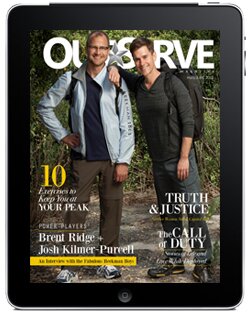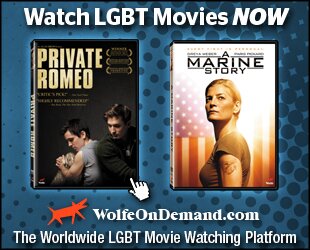Finding My Voice
When I joined the Air Force, “Don’t Ask, Don’t Tell” (DADT) remained in effect, if only for a little while. I was jubilant when I heard that Congress had lifted the policy as I waited in line to receive my rifle one morning. At that exact moment, I recall hearing a Sergeant, who I looked up to, mutter under his breath just loud enough for the rest of us to hear, “fucking faggots,” as he stormed past the clearing barrel. In this moment I fully understood that although DADT was gone, there was much work to be done. And as a brand new Airman, I remained silent. I even felt the need to express my own dissatisfaction with the repeal of the law to avoid hostile retribution.
Fearful of being labeled “the gay kid” or “faggot” rather than being known for the caliber of Airman I was becoming, I made the decision to keep my head down and focus on being the best. Through tireless work, long nights, and extra rotations, I began winning awards at my first duty assignment; eventually, these merits built upon each other and became a steady flow. I was awarded BTZ in front of my flight and peers, and when I was called to the front of my formation my Commander asked, “Are you not happy?” To my complete embarrassment I realized that I was not smiling. My expression was empty. I quickly threw on the face I had become accustomed to showing to the world: a hollow smile, the same one that I put on when my Flight Chiefs bashed gays when they thought there were none in the room. I was courteous and did what was expected of me. I shook, took and saluted, and then fell into the back of my formation with a greater feeling of shame than ever before. I could never know for certain the answer to the question that nagged at me: Would they have given this to me if they knew I was gay?
My plan had failed. Early rank, admiration, and a stupid plaque were supposed to make me feel worthy. Weren’t they? I took a hard look at myself and came to the conclusion that as long as I continued to live behind a façade I would never be happy. Over the next few months I came out to a few members of my family and some of my peers. Although it was difficult at times, I felt liberated, especially when I found that many of my friends were supportive; in fact, they were excited for me! Over the course of a year it became known throughout my squadron that I was gay, but what was better known is that I was an Airman with answers, an Airman who raised newer flight members, and an Airman who could be counted on. I was outspoken but professional. The slurs gradually faded around me, but they were not absent; a select few still refused to hide their intolerance. Although I heard stories from peers about Airmen attacking me for being gay, others were quick to defend my character and the personal attacks were eventually abated. For the first time, I enjoyed an environment in which I was comfortable and at home in my squadron, no longer distanced by hatred and fear.
Unfortunately, this security would not last. I was due to return back to the U.S. for my next duty assignment.
This time when I reported into my training section I was much more self-aware. Knowing I was no longer in my comfort zone, I decided to gauge my environment before I allowed others the opportunity to attack me for being gay. To my complete frustration, it seemed like the clock had been turned back. Every five minutes I would hear, “that kid is a faggot”, “she’s a dyke”, and “this is gay, that is gay.” No one championed for gays in this environment. I didn’t want to go to training, because I was disgusted by these comments. Hours before the weekend began, our Chief, a man whose reputation preceded him, came to speak to us. He was a hero to the younger generation. During his briefing he joked with us, making us laugh. Then he joked with me. He made a joke that I was gay without any prior knowledge that I actually was, and I was momentarily the laughingstock of the room. I immediately reverted to the self-conscious Airman I had been at the clearing barrel years ago. I realized that there must be others in this fresh group of Airmen from tech school who were gay and were subject to the exact same intolerance that I was. I was so furious I considered making a complaint to the Equal Opportunity Office or the Inspector General. After several days of building the nerve, I decided instead to make use of his famous “open door policy.”
I would be lying if I said that I wasn’t terrified, which I confessed as I sat down to speak with him after closing his office door. Respectfully, I addressed what happened the previous Friday. I could see immediately that he regretted the way his words had affected one of his Airmen. I told him that I was gay and that while I understood that what he had said may have been light hearted, those kinds of comments could compromise the unity of our workplace and strike fear and shame into those who were not quite ready to make their sexual orientation known to the world. He assured me that what had occurred would never happen again, and that he meant no harm. He extended his hand before I left his office.
From my experience, I have learned that there have been so many great leaps made for equality in the past few years, but within certain settings in the military being “gay” is still something of a fictitious thing. Though people are aware that gays serve in the military, they don’t necessarily think that there is somebody gay in their unit. This lack of awareness allows them to demean gays—often in the presence of gay service members—because they are not visible if they haven’t come out to their unit. Until this thinking is challenged directly, it will continue, especially if it is condoned by our leaders. But when a face is put to the name “faggot” or “dyke,” others begin to realize that those so disparaged are their peers, friends, and family members. I’m still the same Airman and the same professional, but if we are to finish where “Don’t Ask, Don’t Tell” fell short, it’s important for service members to see that they serve alongside gays too.
– Anonymous, USAF
Editor’s Note
This is a true story and the author is anonymous to prevent further attention from media. The purpose of this story to help service members across all branches find their voice in the face of adversity. Unfortunately, sexual orientation is not protected under MEO, so this service member, as much as he may have liked to seek recourse outside his chain of command, would not have had an avenue for doing so. OutServe-SLDN continues to call on the military to formally enact sexual orientation and gender identity protections for service members.







